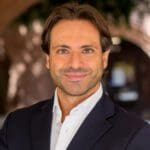When it comes to goals, the month of January is often a time for reflection and resetting. It is also the start of our spring term. To mark these milestones, we called on professors from some of this semester’s gerontology courses for advice on how to leverage their classroom lessons in our everyday lives. Here’s what they shared:
GERO 411L: Physiology, Nutrition, and Aging

“In GERO 411 we are learning about the important role that nutrition and exercise play in promoting healthy aging and longevity. Healthy eating-related tips for the new year…. Stay strong and don’t fall prey to the ease and heavy advertisements to purchase ultra-processed foods versus whole foods. Take time to cook, even meal prep ahead, so you have meals for a few days. Your health is worth it. Remember to eat your colors and feed your microbiome.”
– Cary Kreutzer, EdD, MPH, RD, FAND
Associate Professor of Clinical Gerontology and Pediatrics
GERO 416: Health Issues in Adulthood
 “There is no perfect time to begin your journey towards a healthier and happier life… and you can do it at any age. As gerontologists, we promote successful aging, where individuals can make meaningful contributions to society and can preserve their functional status as long as possible. Modifiable lifestyle factors can affect the way we age and it is never too late to improve diet, build healthy new habits, and pursue intellectual or creative activities. We should add (healthy) life to our years and not just years to our life.”
“There is no perfect time to begin your journey towards a healthier and happier life… and you can do it at any age. As gerontologists, we promote successful aging, where individuals can make meaningful contributions to society and can preserve their functional status as long as possible. Modifiable lifestyle factors can affect the way we age and it is never too late to improve diet, build healthy new habits, and pursue intellectual or creative activities. We should add (healthy) life to our years and not just years to our life.”
– Roberto Vicinanza, MD, PhD
Instructional Assistant Professor of Gerontology
GERO 508: The Mind and Body Connection through the Lifespan

“The mind and body are inexorably linked, each having the ability to positively or adversely affect the other. This relationship is epitomized when observing stress, where psychological stress can cause physiological illness and illness can result in psychological stress. Exercise, mindfulness, and a balanced diet are amongst the positive ways that you can influence both the mind and the body to reduce stress and increase wellbeing. Being aware of this connection is the first step to making changes to improve our total wellbeing and exerting agency over our mental and physical health.”
– Paul Nash, PhD
Instructional Associate Professor of Gerontology





